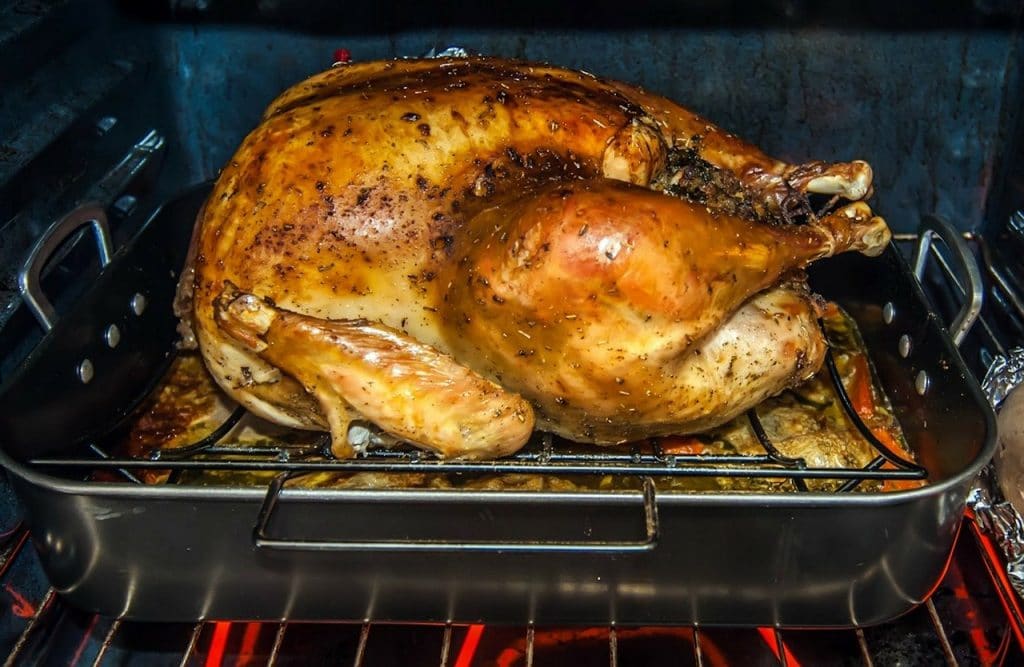
Turkey and gout: Turkey is hugely popular, especially during the holidays, but many gout sufferers tend to avoid it because of its purine content. Do you really need to?
Is Turkey Safe to Eat With Gout?
As always when considering a food’s suitability with gout, we need to look for its purine content — remember that gout is caused by high uric acid (hyperuricemia) and that uric acid is produced as a result of purine metabolism…
Turkey is considered a moderately high purine food, as it has around 100-200 mg of uric acid per 3.5 oz (100 g) serving.
So it doesn’t fall into the high purine category like organ meats, game, and varieties of seafood like anchovies, clams, herring, halibut, mackerel, and so on.
Nevertheless it is moderately high in purines, which can’t be ignored.
Now I know that some gout sufferers — you may be one — tend to stay away from turkey in case it causes a flare-up, simply because it isn’t a low-purine food. And that’s understandable.
However, by doing so they / you are missing out on a wonderful tasty food that packs quite a nutritional punch, especially in the B vitamins 3, 6 and 12…
Nutritional Benefits of Turkey
Here’s a summary of its nutritional benefits as illustrated on the Healthline website
Turkey is rich in nutrients. Two thick slices (84 grams) of turkey contain:
- Calories: 117
- Protein: 24 grams
- Fat: 2 grams
- Carbs: 0 grams
- Niacin (vitamin B3): 61% of the Daily Value (DV)
- Vitamin B6: 49% of the DV
- Vitamin B12: 29% of the DV
- Selenium: 46% of the DV
- Zinc: 12% of the DV
- Sodium: 26% of the DV
- Phosphorous: 28% of the DV
- Choline: 12% of the DV
- Magnesium: 6% of the DV
- Potassium: 4% of the DV
The nutrients in turkey depend on the cut. For example, dark meat, which is found in active muscles such as the legs or thighs, tends to have more fat and calories than white meat — whereas white meat contains slightly more protein.
- So turkey is rich in protein and an excellent source of many vitamins and minerals, especially B vitamins.
- Skinless cuts have fewer calories and less fat than those with the skin on.
- Processed turkey products often pack excessive amounts of salt. To avoid overconsumption, choose unprocessed turkey.
- Turkey is incredibly versatile and can be added to soups, salads, and casseroles.
- It also makes a great replacement for ground beef.
So, is turkey safe to eat if you have gout?
When weighing-up its nutritional benefits against its moderately high purine content and a potentially heightened risk of a gout flare, I’ve personally come down on the side of turkey in my gout diet.
I’ve found that I can eat turkey without any problems as long as I don’t go overboard. In other words, I don’t consume it frequently but, when I do have it, I limit myself to a 3.5 oz (100 g) serving.
You, too, might want to think about limiting yourself to 1 x 3.5 oz (100 g) serving per day, but not every day, which most of us would probably never do anyway.
Stick to white meat with the skin-off and, I know it’s very difficult, but try to do without gravy which can be even higher in purines than the meat itself. At the very least, severely limit the amount you pour over.
And here’s a further tip from Medical News Today:
Limit or avoid processed turkey in the form of deli meats, hot dogs, and turkey bacon, all of which are high in sodium. Even frozen, pre-packed turkey burgers can be full of added salt and preservatives.



